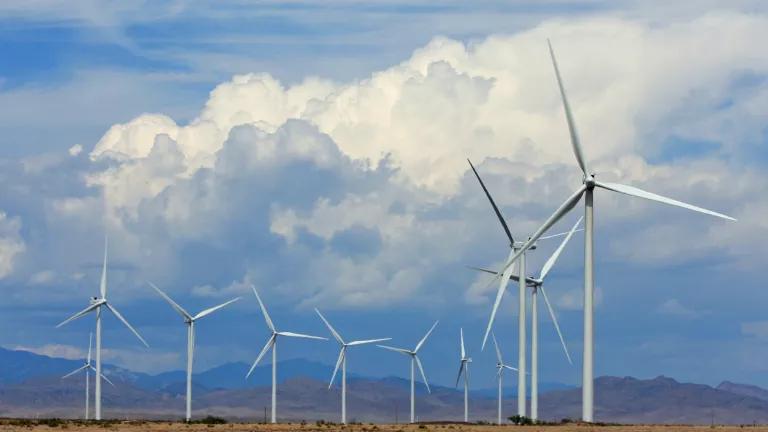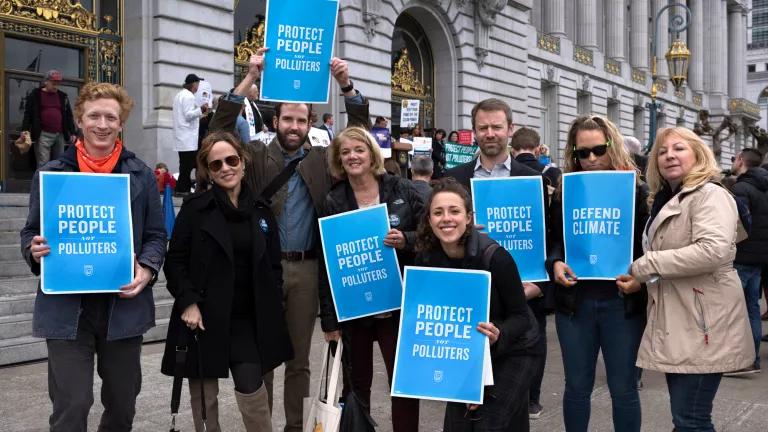New Mexico Leaders Chart Jobs, Health, and Environmental Advances
To realize this environmental progress, we need Governor Michelle Lujan Grisham to sign four key measures—and we hope she will.

Turbines on Macho Springs Wind farm in Luna County, New Mexico
J. N. Stuart via Flickr, CC-BY-NC-ND 4.0
This blog was co-written with James Povijua, regional director of NRDC's Nature program in the Southwest.
Working at a feverish pace day and night, the New Mexico Legislature gaveled its 2024 session to a close, having delivered environmental wins for New Mexicans: creating new job opportunities, improving people’s health, advancing clean energy, and unlocking at least $1 billion in federal funds to support a just and sustainable economic transition that lifts our families and communities.
Not bad for an all-out, 30-day sprint.
This environmental progress came about through concerted and committed efforts by the governor, key state legislators, and public interest advocates on behalf of the people of New Mexico.
Now we need Governor Michelle Lujan Grisham to sign into law at least four key measures that will help New Mexicans while also providing a just transition for low-income communities and communities of color. There’s reason to hope she will because she supported and worked with advocates and community leaders on two of the bills and seems poised to back the other two.
The first measure is the state budget, which contains clean energy tax credits. They will help people buy new and used electric vehicles (EVs); install highly efficient heat pumps in homes and businesses; support expansion of geothermal energy; install advanced energy equipment in manufacturing businesses; and expand wind and solar manufacturing. These environmental tax credits will benefit homes, businesses, and agricultural enterprises, and they will apply to the lands of a federally recognized tribe or pueblo.
The EV credits build on last year’s state approval of advanced clean car and truck standards that will bring an increasing number of electric vehicles to the state, reaching 80 percent through 2032. The EV tax credit, coupled with federal EV tax credits for new and used models, will make the vehicles more affordable to more New Mexicans. The other tax credits will expand clean energy across the state.
Next, the legislature approved setting up a New Mexico Match Fund. Its $75 million in state money will help unlock at least $1 billion in federal funds from the Inflation Reduction Act (IRA) and the Bipartisan Infrastructure Bill (BIL) that require a state match. The state match can be used to support projects that improve energy and power infrastructure and increase access to broadband Internet, transportation, water infrastructure, and more.
In the New Mexico Match Fund, state leaders endorsed using 5 percent of the match fund to help hire grant writers, project managers, and other specialists. These experts will support rural communities, tribes, local governments, wastewater officials, and community organizations as they seek to qualify for federal grants and will work with them until a project is completed.
The match fund will unlock opportunities for everyone, including small and rural communities, so they, too, can thrive, breaking down financial hurdles and fostering equity in growth.
The fund will be paid for from part of the state surplus and will make sure that New Mexico doesn’t leave money that’s available to us on the table. It will also make the state more competitive and attractive to new and existing businesses.
As the match fund heads to the governor’s desk, a recent NRDC blog provides useful guides on how to access IRA and BIL funding that may be helpful for local communities, tribes, and state leaders.
The third measure is the legislature’s approval of a clean fuels standard. California, Oregon, and Washington already enforce low-carbon fuel standards, and now New Mexico is following suit. The bill requires a reduction in the intensity of greenhouse gas pollution for transportation fuels used in the state, set at 20 percent by 2030 and 30 percent by 2040. It calls for producers of high-polluting fuels to buy credits from producers and importers of low-carbon fuels.
The clean fuels standard will deliver big health benefits to New Mexicans by reducing the air pollution that contributes to ozone.
The fourth measure is a TANF (Temporary Assistance for Needy Families) Funds Workforce Pilot Program. Spearheaded by Somos Un Pueblo Unido, this is a tangible example of a just transition policy. The bill would create a three-year pilot program within the Adult Education Division of New Mexico’s Higher Education Department to provide economic support through recurring stipends to low-income workers enrolled in certain time-bound workforce training programs, and it will help support sustainable and clean energy jobs.
Did we get everything we wanted? No—reforms to the 1935 Oil and Gas Act to better protect people from pollution fell by the wayside.
But these environmental measures are meaningful and especially so, given the vast number of bills that were filed and did not make it through the 30-day sprint.
By enacting the tax credits, match fund, clean fuels standard, and workforce training program, state leaders will not only create jobs and economic growth in clean energy and reduce harm from climate change and unhealthy air pollution, but they will also foster healthier and stronger families and communities.
The legislature and the governor deserve credit for working together to improve the lives of all New Mexicans.




